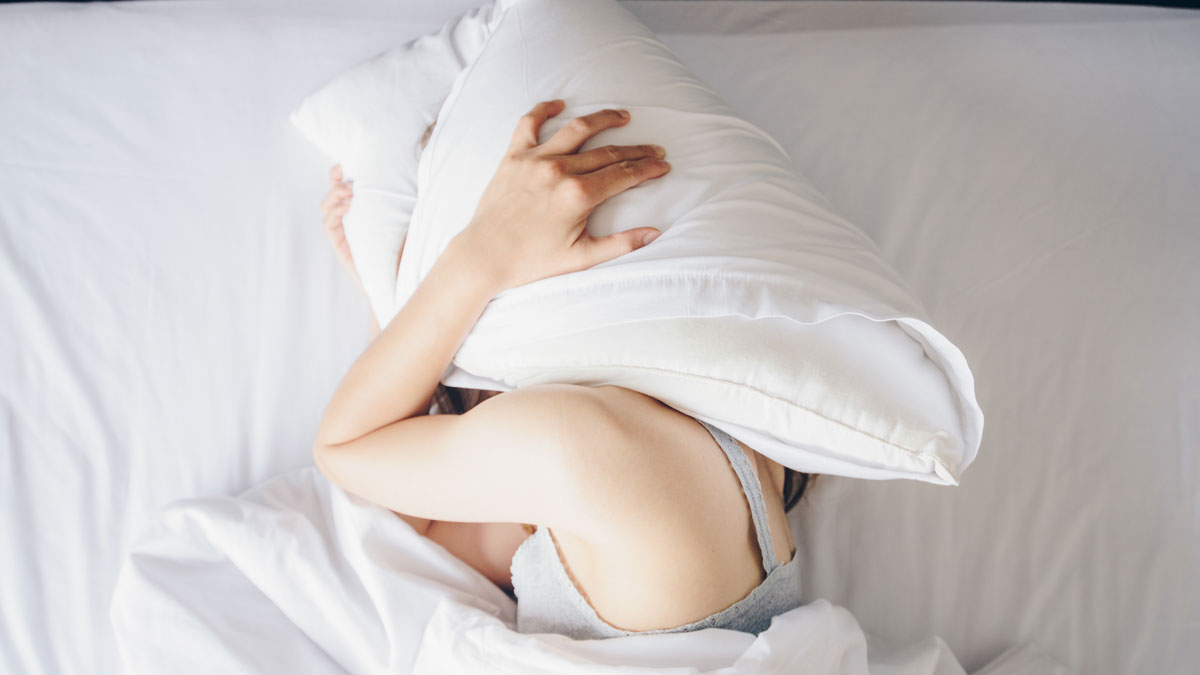The Vicious Cycle Behind PCOS and Sleep Issues, and How to Combat the Problem

Polycystic Ovarian Syndrome, better known as PCOS, is the most common endocrine disorder worldwide, affecting at least 1 in 10 women and people assigned female at birth (AFAB). It is a complex condition which affects a woman’s hormone levels and the way the ovaries function, resulting in a wide range of reproductive, metabolic, and psychological symptoms that affect women differently.
Outside of the main tell-tale symptoms, there are several lesser-known symptoms of PCOS including sleep disturbances, which can have huge short-term and long-term complications. Here we dissect this relationship, along with some ways to combat the dual issues.
Sleep, Hormonal Balance & PCOS
Sleep is an essential pillar of a healthy lifestyle for everyone and can cause severe hormonal disruption when there is a lack of restorative sleep. A lack of deep restful sleep can result in androgen excess, fluctuations in both blood sugars and cortisol (often termed the stress hormone) levels as well as worsening of insulin resistance in those with PCOS. Disturbed sleep also impacts hormones that regulate appetite such as ghrelin and leptin.
This can lead to one choosing more calorie-dense, nutrient-poor foods, such as burgers or sugary foods, which further worsen blood sugars and sleep patterns, thus creating a vicious cycle.

Commonly Sleep Issues Experienced By Those With PCOS
Sleep disturbances in PCOS are unfortunately under-recognised and underreported. Insomnia (difficulty falling asleep or staying asleep) and obstructive sleep apnoea (when breathing stops and starts during sleep) are common in PCOS. Snoring, excessive daytime sleepiness and morning headaches are all signs of sleep apnoea.
If this applies to you, ask for an urgent referral by your health professional to a sleep medicine clinic for further tests and treatment. This is because there is a link between obstructive sleep apnoea and long-term health problems including heart problems.
If you have been diagnosed as being in the excess weight range or have insulin resistance (this applies to the majority of people with PCOS), this carries the highest risk of sleep disorders, although you can be in the “healthy” BMI range and still suffer from sleep apnoea so don’t hesitate to seek help.
The Effect Of Better Sleep On PCOS (And Vice Versa)
Sleep quality and PCOS are linked as worrying about symptoms of PCOS such as acne, excessive hair growth, fertility or body image issues can result in disturbed sleep. Addressing these and treating the symptoms of PCOS by adopting a healthy lifestyle (plant-based diet, regular movement etc.) will likely help you get a better night’s sleep).
Restful sleep can also help address hormonal fluctuations and improve blood sugar control in PCOS. It is important to note that lifestyle changes and cognitive behaviour therapy for insomnia (CBT-I) should be tried before sedatives.

The Dangers Of Too Much Sleep
Women with PCOS are at higher risk of oversleeping (regularly needing more than nine hours in a night).
This can also be a warning sign for other underlying health conditions, including sleep disorders such as sleep apnoea or mental health conditions such as depression, both of which people with PCOS are at greater risk of. Oversleeping is associated with other chronic conditions such as type 2 diabetes and cardiovascular disease so it may be helpful to keep a sleep diary and discuss your concerns with your doctor. Do seek help as there are many techniques and lifestyle interventions that can help improve sleep.
Sleep Tips To Combat PCOS
Prioritise your sleep to ensure you get seven to nine hours of restorative sleep every day by focusing on the following:
- Avoid stimulants such as caffeine a minimum of six hours before bed, and ideally avoid it after midday. Some people are very sensitive to caffeine so it might be best to choose decaffeinated versions of tea and coffee. Caffeine is often found in other foods and beverages such as green tea, dark chocolate and energy drinks.
- Keep bedtimes and wake-up times consistent. Sleeping in a darkened cool room, perhaps with an eye mask and/or ear plugs, can make a profound difference to the quality of your sleep. Avoiding bright light and blue light a few hours before bedtime from mobile phones and other screens is advisable as they suppress the secretion of melatonin — a hormone that influences circadian rhythms.
- Exposure to daylight in the morning can help promote a restful night’s sleep, along with regular exercise. Try exercising outdoors in the morning for maximum benefit. Even a 20-minute walk can make a huge difference.
- Develop a relaxing bedtime routine. For example, try to unwind with a warm bath, enjoy a caffeine-free herbal tea such as chamomile, read a book or adopt a short meditation practice.
There is an entire chapter dedicated to improving sleep in my new book Living PCOS Free (written alongside Dr Nitu Bajekal) with further practical advice you can implement.
References
Living PCOS Free (Hammersmith Health Books) by Dr Nitu Bajekal and Rohini Bajekal is out on 28th April 2022. This practical guide will show you how to successfully manage your condition using proven lifestyle approaches alongside western medicine.
With over 35 years of clinical experience, Dr Nitu Bajekal breaks through misinformation, providing clarity and support to help you tackle your symptoms – from irregular periods to acne and anxiety. The book features an easy-to-follow 21-day plan for hormonal health along with plant-based recipes and illuminating case histories.


















